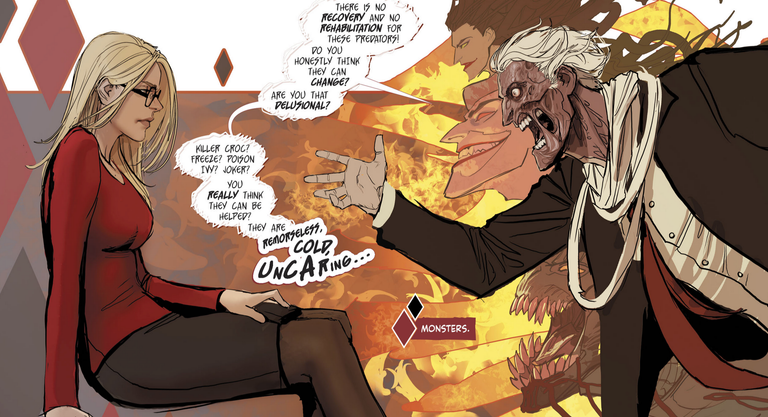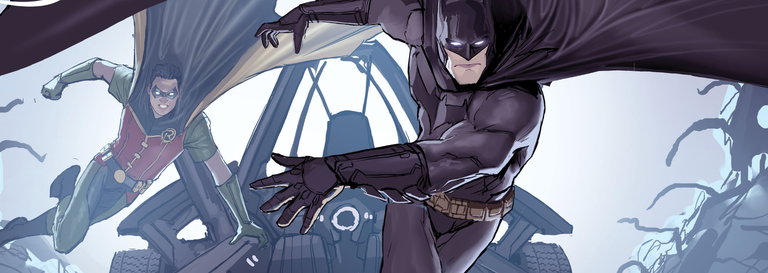
The other day I wrote a post on Harleen and how I discovered the comic in a book shop in Yerevan, that post went into how I was quite surprised at the quality of this comic, how one man was behind the art and the story and the impact that had on the comic itself. It was a great first volume read that showcased the backstory of Harley Quinn's character in a different light, very different to the usual themes that are found within that realm of DC's character lineup. That first volume showed Harley's life before attending Arkham, showing the events that led to her being sent there to further research her work into understanding the criminal mind and seeking a way to essentially breakdown the concept of empathy and how criminals end up fundamentally lacking it. This research was coincidentally funded by Bruce Wayne's corporation, which itself had its own agendas regarding the criminal mind and trying to decipher it. Harley's life before Arkham was portrayed in a manner of loneliness and ultimately bullying. A woman that had made many mistakes in her life and had often been delivered the short stick, no workplace felt suitable for her, and while she did have a friend, they seemed to be quite opposite. Harley's general notion was gentle, a woman that had no ill-intent for anyone, which ended up causing her to be exploited by others knowing that she'd never fight back and stick up for herself.
It was only after her encounter in the streets where she discovered the insanity of Joker, witnessing his clashing with Batman in the night, and how that ended up traumatising her. Joker himself putting a gun to her head and choosing to not pull the trigger in the end. That event leading to her having nightmares every night, struggling to sleep and even refusing to do so, thinking she could escape the haunting dreams by simply not sleeping at all. This led to her mentally breaking down more, relying on coffee and even more deranged as the weeks went by. Harley now working at Arkham and witnessing the criminals there firsthand, slowly developing an interest in Joker who is held there. That interest coming from trying to understand him and why he let her live, alongside trying to decipher his intentions and the way his mind works as part of her work. There were a few panels that showed how Joker had once revealed his true self on camera, no longer playing games but speaking directly to the viewer: the world itself had caused him to become that monster. That society itself is to blame for being so unforgiving and encouraging a lack of empathy in people in order to survive. In a world of the survival of the fittest, empathy can easily lead to being the loser. These panels went on to show that Joker was the way he was out of hatred for society, and he was simply acting out in a more exaggerated manner of how society wanted to shape him.

At the end of the first volume it was already clear that Harley was changing, and that the inevitable character she would become was already showing some hints of being there. This second volume starting off with a bit of that character later on, before resorting back to the past where Harley drinks alone at night, talking to herself about the hypothesis she had regarding long term exposure to traumatic environments. How Joker had implied that the chaotic mind is always present, its default natural state that's waiting to come out. I liked that in this volume it expanded upon the creation of another character: Two-Face. Harvey Dent in the previous volume was trying to convince Harley to drop the investigation and not take the money from Bruce Wayne. Only later would Dent have an acidic mixture thrown into his face on live television to create the Two-Face character, this amplified that barbaric nature of Joker's previous statements, and Harley's realisation that even the news media thrived on displaying brutality, contributing to that statement regarding everyone having a monstrous nature by default, and that traumatic events are constantly streamed to the population at all times.
I really like the attention to the concept of morals in this volume, with numerous characters explaining how the justice system, including Batman, had failed society by constantly releasing criminals back into the city of Gotham, and how regular people continued to suffer as a result. Whether it's the concept of good behaviour or corruption. A group of executioners had taken matters into their own hands, kidnapping other criminals and killing them to remove them from the pool for good. The news report on this detailed how the general population had strong approval of the executioners. That society was so broken that the general population wanted death and blood to be spilled providing it was deserved. The approval of an identity like Batman lowered due to his less violent agenda that saw him never killing, only leading to the same criminals just ending back into the world somehow and causing more harm. This has always been a problem of his character; his lack of action that leads to the status quo never actually shifting up. Always leading to innocent people getting harmed. This question is actually brought up again later on, as Harleen actually asks Batman directly why he doesn't kill: the answer being he doesn't want to give up hope that people can change, nor does he want to give up on himself. A lame excuse, really.

This is where Harleen starts to realise the insanity of everyone around her, how nothing makes sense anymore. Met with the statement that she feels like Arkham actually seems more sane. Back to a conversation with Joker that just speaks about how it really is, the corruption, the defeatism of society, the vigilantes that themselves should be considered criminals but are never condoned despite the physical harm they cause on people. That twisted concept of justice yet again. A common theme within this comic so far. But I'd be repeating myself if I mentioned it all again! Though what was interesting was seeing how Joker talked about Batman, how Batman was no different, another bloodthirsty individual that wanted to feel good despite changing nothing about the world, just contributing to more of the violence and fear spread throughout it, the hypocrisy of that enter character. A nice contrast given how the Batman comics tend to be, often prioritising his agenda as something positive. Though one nice touch was how Joker detailed how if Batman does one day kill, it speaks on how anyone can inevitably slip up and make the same mistake one day, almost giving the green light to everyone else.
I like that the comic focused on the creation of other characters at the same time as Harley Quinn, the differences in how various actions throughout the city, the pollution of its people, had created different types of monsters. Though there is only one more volume left, I'm curious as to whether it has more to say or whether it will end up repeating itself a little too much.